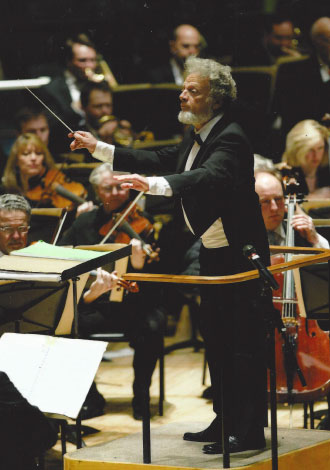Issak Tavior – conductor (Israel)

Isaak Tavior is a pianist, composer and conductor. He was born in Haifa, Israel in 1943. Tavior was the recipient of the Prize for Creativity in the field of Zionism in 2012, granted him by the Israeli Minister of Culture, Limor Livnat, for his 2004 composition “Vision of the Valley of Dry Bones” named for the prophecy of the same name.
Throughout his musical studies, he received support from the America-Israel Cultural Foundation. Tavior graduated from the Conservatory in Haifa, where he was tutored by Rachel Katz.
At 16, Tavior was accepted as a second year student to the Jerusalem Academy of Music and Dance.
At the age of 20 he graduated from the Music Academy of Tel Aviv.
Tavior performed recitals at various radio stations in Europe, including ones in Amsterdam, Brussels, Geneva, Zurich, Munich, Dublin and Frankfurt. He also appeared as a solo pianist with the Kol Israel Symphony Orchestra (now renamed Jerusalem Symphony Orchestra), the Haifa Symphony Orchestra, Mozarteum Orchestra Salzburg and Radio Lugano.[
Tavior recorded several select compositions by Beethoven, Chopin, Brahms, Bach, Mussorgsky, Liszt and others.
Tavior taught music in a number of high schools in Israel and conducted numerous choirs. He managed and directed the Hebrew University of Jerusalem Orchestra from 1971 to 1974. In 1975 Tavior co-founded the Karmiel Music Conservatory in Israel.
Tavior composed eight oratorios for symphony orchestra and soloists: Shema Israel (2003), Vision of the Valley of Dry Bones (2004), Mount Sinai (2006), The End of Days (2007), The Wisdom of Solomon (2011) and In the Land of Moriah (2015).
The Vision of the Dry Bones
Ezekiel’s parable reflects the resurrection and uplifting of the people of Israel from the abyss of exile and Holocaust to redemption and the return to the land of Israel (Ezekiel, 37:12): “Thus said the Lord God; Behold, O my people, / will open your graves, and cause you to come up out of your graves, and bring you into the land of Israel”.
The composer envisaged Ezekial’s prophesy (that inspired his composition) as the prediction of the return to Zion and gathering of the exiles into the Land of Israel. The ‘dry bones’ are a metaphor for the bones of those who perished in the Holocaust, and Ezekial asks in the verse “bring you into the land of Israel” to whom does “you” refer, if not to the souls of Israel interwoven into Jewish existence for eternity?
And it shall come to pass in the last days (The Last Days to Come)
Issak Tavior
(b.1943)
This work contains a collection of comforting prophecies by Isaiah, Amos and Zephania depicting a state of world peace. (Isaiah 2:2): “Nation shall not lift up sword against nation, neither shall they learn war any more” (Isaiah 11:9): “The world will be filled with the knowledge of the Lord like water covering the sea”.
The composer gathered the comforting prophesies of some of the Prophets of Israel. These are reflected in the composition through his adherence to the vision of the Last Days to Come – a belief that the achievement of this vision may be lengthy and fraught with obstacles, but it will eventually arrive.
Programme notes for The Vision of the Dry Bones, Mount Sinai Cantata and The Last Days to Come written by the composer, Issak Tavior.

